On this page
Our work
We work with communities, government agencies and other organisations to strengthen the wellbeing of ethnic communities in Aotearoa New Zealand.
What we do:
- Advise on the impact of government policies on ethnic communities and look for opportunities for positive change
- Improve how the public sector responds to the needs of ethnic communities
- Understand what ethnic communities need to succeed and communicate this to the government
- Support ethnic communities to achieve their goals
We want to help create real change for ethnic communities in New Zealand. By working together and sharing knowledge, we can support ethnic communities to thrive in New Zealand society.
Our values
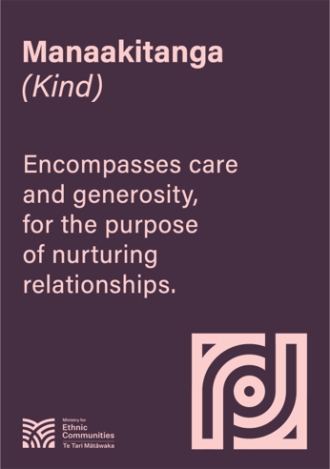 |
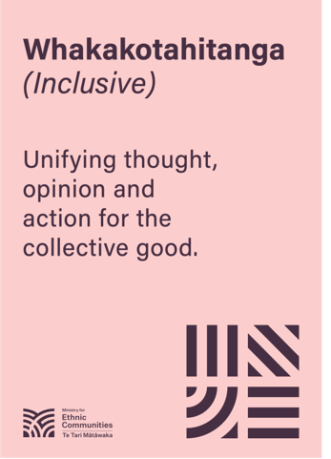 |
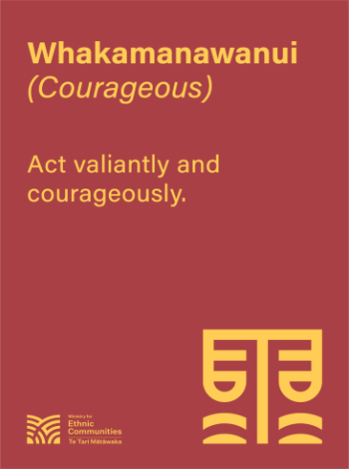 |
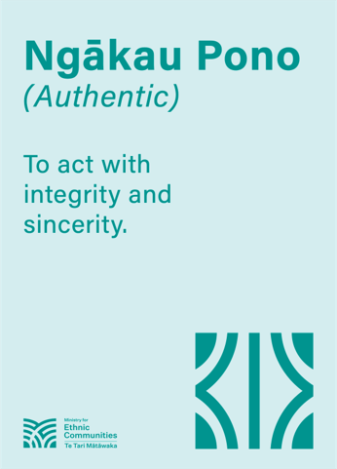 |
Our priorities
To understand what ethnic communities want us to focus on, the Minister for Diversity, Inclusion and Ethnic Communities ran a series of targeted workshops in April and May 2021.
Based on the results of the workshops, Cabinet agreed the Ministry’s priorities are to:
- Promote the value of diversity and improve the inclusion of ethnic communities in wider society
- Ensure government services are provided fairly and are easily accessible for ethnic communities
- Improve economic outcomes for ethnic communities and look at the barriers to employment
- Connect and uplift ethnic community groups
To learn more about the workshops, and the goals and priorities of the Ministry for Ethnic Communities, check out the following links:
Engagement on the Ministry for Ethnic Communities
Our journey
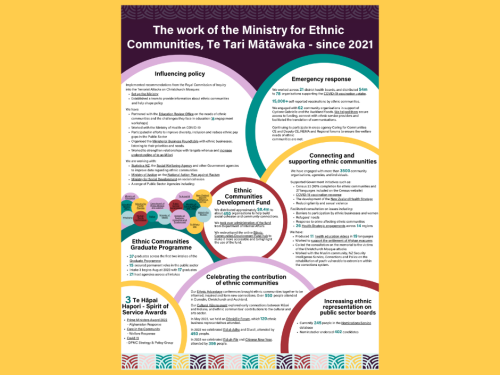
To mark our second anniversary, and to hold ourselves to account, we looked back at our work over our first two years as a Ministry.
Read about our journey so far by clicking the links below.
Explore our Ministry's work in this interactive diagram (PDF)
Read 'Our Journey, two years on - achievements 2021-2023' (PDF)
Our strategy
Our strategy builds on what our ethnic communities told us we should focus on in our first few years. Our ethnic communities and stakeholders told us they wanted to belong, to contribute, and be seen as strong contributors to Aotearoa New Zealand's growth and future.
Click the link below to read our full strategy.
Strategy 2022 - 2025 - A pathway to an Aotearoa where ethnic communities feel at home.
Our strategy:
- Outlines the plans and actions we will work on until 2025
- Sets out how we will work with government agencies, the private sector, and others
- Aims to turn our priorities into real pieces of work that will benefit our ethnic communities
- Describes how we want to celebrate and promote the value of ethnic diversity
Our plans
As part of our strategy, we are also working on the Kia Toipoto Action Plan. Kia Toipoto is a Public Service Commission plan to reduce gender, Māori, Pacific and ethnic pay gaps in the public service.
Read our Kia Toipoto and Papa Pounamu Plan
Find out more about Kia Toipoto on the Public Service Commission website
Honouring Te Tiriti o Waitangi
An important part of our role is to honour the Crown’s responsibility to act in a way that is in line with Te Tiriti o Waitangi Aotearoa. We have included work in our strategy that aims to strengthen relationships with tangata whenua and increase understanding of te ao Māori.
Watch the videos below to find out more about our strategy.
Our Executive Leadership Team

Mervin Singham, Chief Executive

Fleur Murray, Deputy Chief Executive, Corporate Services
Fleur joined the Ministry in August 2021, continuing a successful career in a wide range of leadership roles. She has held senior executive positions in a range of organisations, including Meridian Energy, PG Wrightson’s, Inland Revenue, ANZ Bank, New Zealand Racing Board and TAB, Parliamentary Service, and most recently, Group Manager Shared Services at the Royal Commission of Abuse In Care. Fleur and her team are responsible for all the Ministry’s corporate work, including communications, human resources, health, safety and wellbeing, governance, reporting, property, finance and procurement, and privacy and security.

Pratima Namasivayam, Deputy Chief Executive, Advisory, Analytics and Ministerial
Pratima joined the Ministry in March 2022 from the Ministry of Defence. With a background in policy, law and management, Pratima’s career has been in New Zealand’s public service. Since starting as a Policy Advisor in the Public Law Unit of the Ministry of Justice, she has held many professional roles in the Department of the Prime Minister and Cabinet, Canterbury Earthquake Recovery Authority, ACC, and the Ministry of Fisheries. For the last three years, she has acted as an independent consultant for the Crown Law Office, the Ministry of Education, and Waka Kotahi - New Zealand Transport Agency. Her management career has included strategic and operational policy, legislative change and implementation, organisational change programmes, and negotiations on behalf of the Crown. Pratima has post-graduate qualifications in health sciences and law, and is an enrolled Barrister and Solicitor of the High Court of New Zealand.

Berlinda Chin, Acting Deputy Chief Executive, Strategic Engagement and Stakeholder Insights and Chief Advisor
Berlinda joined the Ministry in August 2021, having previously held leadership roles with the Office of Ethnic Communities, including Director. Her career in New Zealand has been across many roles connected to diversity and multi-culturalism. These included Strategic Specialist on Ethnic Communities at the State Services Commission, Private Secretary to two different Ministers with Ethnic Community portfolios, and Intercultural Advisory Manager at the Office of Ethnic Affairs. Before joining the Ministry, she was Head of Community Engagement for the Royal Commission of Inquiry into Historical Abuse in State Care. Berlinda works across a wide range of Ministry portfolios and is the key contact with the Minister’s office.
Our Minister
The Minister for Ethnic Communities, is Hon Mark Mitchell.
Our history
Plans for the Ministry started in 1995, with the Ethnic Affairs Desk within the Department of Internal Affairs. Since then, the organisation has grown, both in size and work.
In December 2020, Cabinet agreed the Ministry for Ethnic Communities would be created from 1 July 2021.
Click on the link below to see the main points in our journey to becoming a full Ministry.
